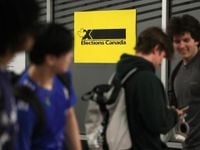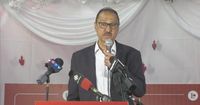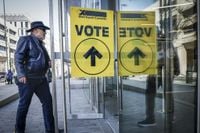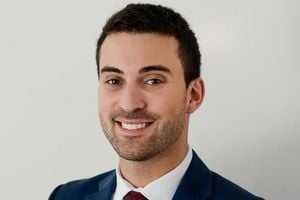Residents across Calgary, Edmonton, and all of Alberta flocked to the polls on April 28, 2025, for the federal election, where they cast their votes to elect a new government. In a surprising twist, the Liberal Party, led by Mark Carney, is projected to secure a fourth consecutive term, despite Alberta's reputation as a Conservative stronghold.
As the night progressed, it became clear that while the Liberals were gaining traction nationally, Alberta remained firmly in Conservative hands. The Tories were on track to win the majority of the province's 37 ridings, reflecting the historical voting patterns of the region. According to preliminary results, the Conservatives managed to hold off any significant Liberal gains in Alberta, a province where they have traditionally dominated.
In Calgary, notable victories included Greg McLean in Calgary Centre, who retained his seat, and newcomers like Dalwinder Gill, who won in Calgary McKnight. Other Conservative successes included Pat Kelly in Calgary Crowfoot, Jasraj Hallan in Calgary East, and Shuv Majumdar in Calgary Heritage. The results were consistent with previous elections, showcasing the Conservatives' stronghold in the city.
Meanwhile, in Edmonton, the outcome mirrored Calgary's results, with the Conservatives winning several key ridings. Tim Uppal in Edmonton Gateway and Ziad Aboultaif in Edmonton Manning were among the incumbents who successfully defended their seats. However, the Liberals did manage to make some inroads, with Eleanor Olszewski winning in Edmonton Centre, a seat that had previously been held by the Liberals in the last election.
As the election results unfolded, it was evident that the Liberals had successfully garnered enough support to form a government, albeit with uncertainty surrounding whether they would achieve the necessary 172 seats for a majority. Mark Carney's leadership was solidified as he faced challenges not just from domestic opposition but also from external pressures, particularly from U.S. President Donald Trump, who had made headlines with threats regarding tariffs and annexation.
In a broader context, the election was not just about party politics but also about Alberta's identity and its relationship with the federal government. Premier Danielle Smith had previously raised the specter of Alberta sovereignty, suggesting that the province might consider separation if its demands regarding energy policy were not met. This sentiment resonated with a segment of the electorate, potentially influencing their voting decisions.
As results continued to pour in late into the night, the Conservatives remained the dominant force in Alberta, winning the majority of the seats, including several in Northern and Southern Alberta. In Fort McMurray-Cold Lake, Laila Goodridge retained her seat, while Chris Warkentin won in Grande Prairie and Shannon Stubbs in Lakeland.
The election also highlighted a notable trend: while the Conservatives were expected to win most of Alberta's ridings, the Liberals and New Democratic Party (NDP) made some significant gains in urban areas. The NDP, for instance, managed to secure two seats in Edmonton, while the Liberals captured one seat each in Edmonton and Calgary, indicating a potential shift in voter sentiment in more progressive pockets of the province.
As the night wore on, the numbers began to reflect a tighter race than anticipated. By 1:14 a.m. on April 29, 2025, the Liberals had 152 races called in their favor, leading in 13 other ridings, while the Conservatives had 143 races called, leading in four others. The Bloc Québécois and the New Democrats trailed significantly, with the former winning 22 races and the latter five.
In the newly created riding of Edmonton Southeast, Jagsharan Singh Mahal of the Conservative Party was projected to win, with 20,810 votes, which accounted for 53.41% of the total. This riding was closely watched, as it was the first time it had been contested following the 2023 representation order for Alberta.
As the election drew to a close, the implications of the results began to unfold. Mark Carney's administration would have to navigate a complex political landscape, balancing the demands of Alberta's Conservative base with the expectations of voters across the country. The prospect of continued tension with the United States, particularly with Trump's administration, loomed large over Carney's government as he prepared to take the reins of leadership once more.
The results of this election not only reflect the political landscape of Canada but also underline the ongoing challenges facing the nation as it grapples with issues of identity, governance, and international relations. With Alberta's unique position as a conservative bastion, the dynamics of the federal government will undoubtedly be shaped by the voices and votes of its residents in the coming years.






